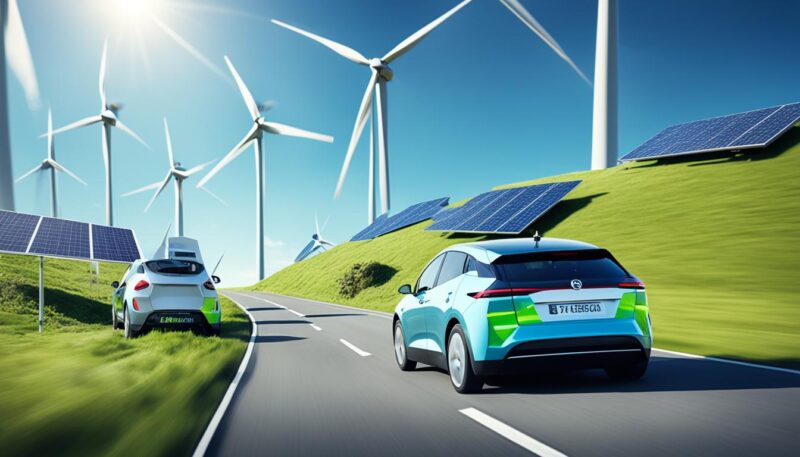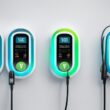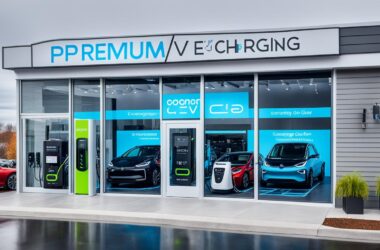Electric vehicles have gained significant popularity in recent years due to their environmental benefits and cost savings. However, to fully leverage the advantages of electric vehicles, it is crucial to understand and optimize their efficiency. One important metric that measures electric vehicle efficiency is miles per kWh (mpkWh). In this guide, I will explain what mpkWh is, why it matters, and how you can maximize it to reduce energy usage and enhance your electric vehicle’s performance.
Key Takeaways:
- Miles per kWh (mpkWh) is a measure of an electric vehicle’s efficiency, representing the distance it can travel on one kilowatt-hour of electricity.
- Understanding mpkWh helps determine an electric car’s range and budget for power costs.
- Factors like driving style, weather conditions, and car age can impact mpkWh.
- Most electric cars have a range of 3-4 miles per kWh, with higher numbers indicating greater efficiency.
- Maximizing mpkWh involves optimizing driving techniques and reducing energy consumption through various strategies.
Understanding Miles per kWh and its Importance
Miles per kWh (mpkWh) is a crucial metric when it comes to determining the efficiency of electric cars. Similar to miles per gallon (mpg) for gas-powered vehicles, mpkWh measures how far an electric car can travel on one kilowatt-hour of electricity. Knowing your car’s mpkWh rating is essential as it directly impacts your car’s range on a single charge and helps you budget for power costs.
Several factors influence mpkWh, including your driving style, weather conditions, and the age of your car. By understanding these factors, you can make informed decisions to improve your electric vehicle’s energy efficiency and optimize your driving experience.
Most electric cars have an mpkWh rating between 3 to 4 miles. Higher mpkWh ratings indicate greater efficiency, meaning the car can travel more miles on the same amount of electricity. By calculating mpkWh, you can assess the efficiency of your car by dividing the number of miles driven by the kilowatt-hours consumed.
Maximizing mpkWh is beneficial for both environmentally-conscious drivers and those looking to minimize their power costs. By optimizing your driving habits and leveraging the potential of your electric car, you can achieve greater energy efficiency and extend your vehicle’s range on each charge.
Next, we’ll explore the differences between mpkWh, mpg, and MPGe, providing a comprehensive understanding of electric car efficiency and energy consumption.
Comparing Miles per kWh to MPG and MPGe
Miles per kWh (mpkWh) is the electric car equivalent of miles per gallon (mpg) for traditional cars. It measures how far an electric car can travel on one kilowatt-hour of electricity. This metric is essential for assessing the energy efficiency of electric vehicles and comparing them to their gasoline counterparts.
While mpkWh is specific to electric cars, miles per gallon equivalent (MPGe) is used to compare the energy efficiency of electric and gas cars. MPGe is a measure standardized by the Environmental Protection Agency (EPA) to provide a fair comparison of energy use across different vehicle types.
The formula to calculate MPGe is: MPGe = (33.7 × battery capacity in kWh / electricity used to travel 100 miles in kWh). This formula takes into account the differences in energy conversion rates between electric car motors and combustion engines.
“Electric car motors are more efficient at converting energy into movement compared to combustion engines, resulting in higher energy conversion rates for electric cars.”
By understanding the differences between mpkWh, mpg, and MPGe, drivers can make informed decisions when evaluating the energy efficiency of different vehicle types. This knowledge allows them to consider the environmental impact and long-term cost savings associated with electric vehicles.
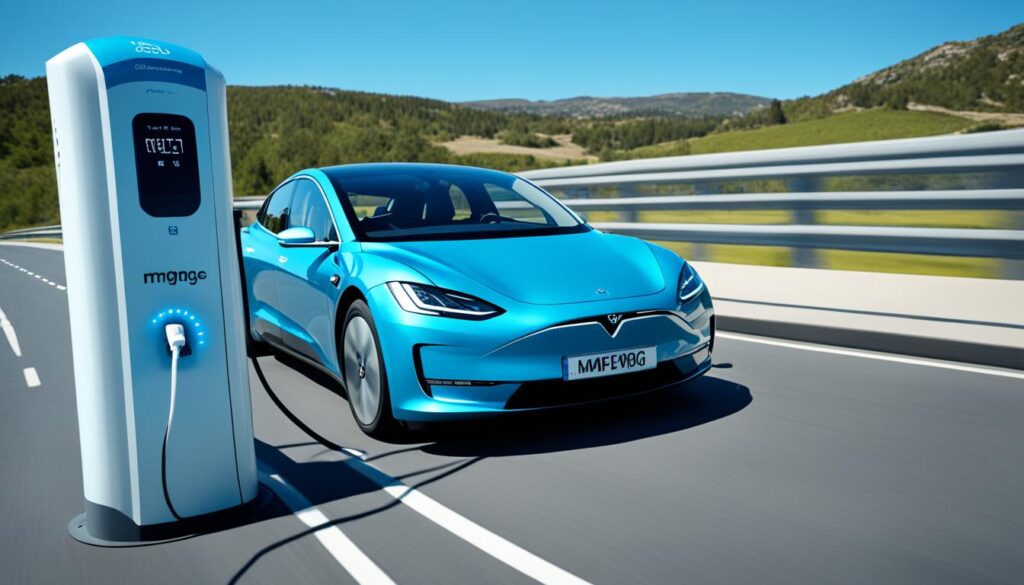
| Miles per kWh (mpkWh) | Miles per gallon (mpg) | Miles per gallon equivalent (MPGe) | |
|---|---|---|---|
| Definition | Measures how far an electric car can travel on one kilowatt-hour of electricity. | Measures how far a gasoline car can travel on one gallon of fuel. | Standardized measure for comparing energy use across different vehicle types. |
| Unit | Miles | Miles | Miles |
| Higher Value Indicates | Greater electric car efficiency and energy savings. | Greater fuel efficiency and reduced gasoline consumption. | Higher energy conversion rates and reduced environmental impact. |
Source: Environmental Protection Agency (EPA)
Tips to Improve Electric Vehicle Efficiency
To maximize the energy usage and improve the efficiency of your electric vehicle, consider implementing the following practical tips:
- Utilize Regenerative Braking: Take advantage of regenerative braking, a feature that allows the vehicle to recover and store energy while braking or decelerating. This energy can then be used to power the vehicle and reduce reliance on the battery.
- Maintain Optimal Tire Pressure: Regularly check and maintain the optimal tire pressure recommended by the vehicle manufacturer. Properly inflated tires reduce rolling resistance, which improves overall efficiency and extends battery life.
- Optimize Heating and Air Conditioning Usage: Use heating and air conditioning sparingly, as it can significantly impact the vehicle’s energy consumption. Consider using the vehicle’s eco mode or pre-conditioning features to minimize energy usage.
- Reduce Excess Weight: Remove unnecessary items or excess weight from your vehicle. The lighter the vehicle, the less energy it requires to accelerate and maintain speed, resulting in improved efficiency.
- Utilize Eco Mode: Engage the eco mode feature available in many electric vehicles. Eco mode adjusts various settings to optimize energy usage, such as limiting acceleration and reducing power to auxiliary systems.
- Plan Efficient Routes: Utilize route planning tools or apps that consider factors like distance, elevation changes, and charging station availability to optimize your travel route. This helps minimize energy consumption and maximizes your electric vehicle’s range.
By implementing these tips, you can enhance the efficiency of your electric vehicle, improve its overall mpkWh, and maximize its energy usage.
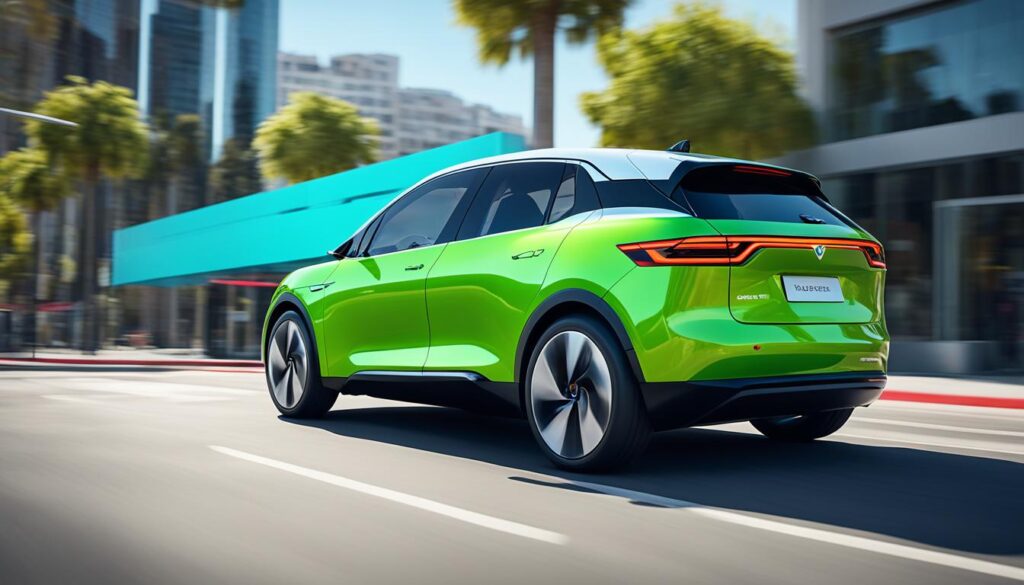
Electric Vehicle Efficiency Comparison
| Vehicle Model | MPkWh |
|---|---|
| Nissan Leaf | 3.5 |
| Tesla Model 3 | 4.2 |
| Chevrolet Bolt | 3.8 |
“Implementing these tips not only helps improve the efficiency of electric vehicles but also contributes to sustainable transportation practices. By making conscious choices and optimizing our energy usage, we can create a greener and more sustainable future.”
By following these tips, you can enhance the efficiency of your electric vehicle, improve the mpkWh, and contribute to a greener future.
Conclusion
Maximizing miles per kWh (mpkWh) is crucial for optimizing the energy efficiency of electric vehicles. By understanding and improving mpkWh, drivers can maximize the range of their electric cars and minimize energy consumption. Factors such as driving style, weather conditions, and car age can impact mpkWh, but by following practical tips like staying within speed limits, using regenerative braking, and optimizing tire pressure, drivers can improve their vehicle’s performance.
Additionally, considering the most efficient electric car models in terms of mpkWh can help drivers make informed choices when purchasing a new electric vehicle. Choosing a vehicle with higher mpkWh can result in significant energy savings and reduced environmental impact. By prioritizing mpkWh efficiency and adopting sustainable transportation practices, drivers can contribute to a greener and more sustainable future.
Electric vehicles offer a promising solution for sustainable transportation, as they produce zero tailpipe emissions and rely on electricity, which can be generated from renewable sources. Maximizing mpkWh helps drivers make the most of their electric vehicles’ energy efficiency, reducing their overall carbon footprint and promoting a cleaner environment. By embracing electric vehicle efficiency and sustainable transportation, we can pave the way for a more sustainable future.




